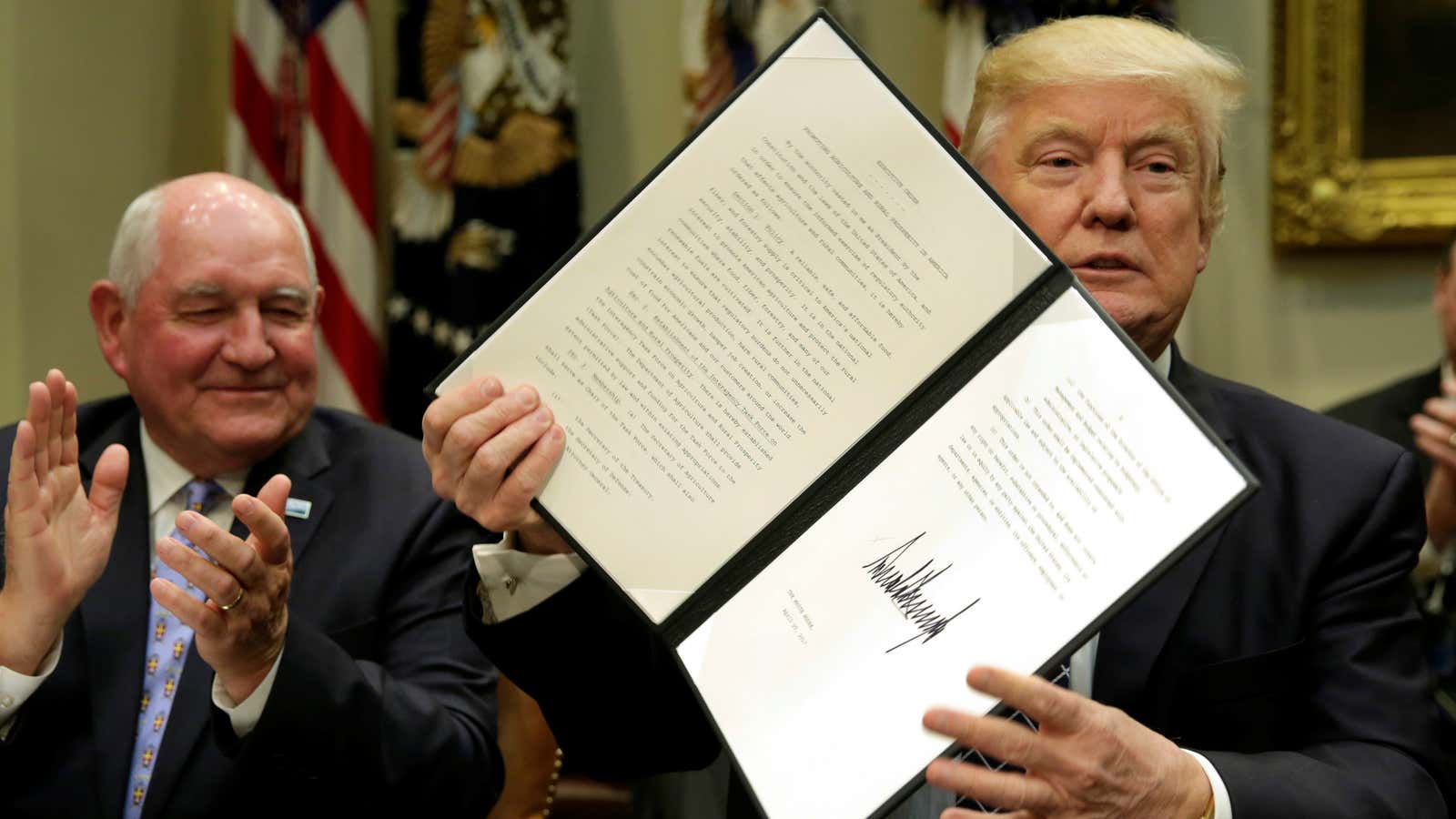For 23 years the relative free flow of food between the US, Canada, and Mexico has kept North American supermarkets well stocked with a kaleidoscope of produce and meats.
Now that three-way relationship is turning into a major stomach ache.
The fate of the North American Free Trade Agreement—the policy better known as NAFTA, which binds the three countries—hangs in the balance. American president Donald Trump this week announced that his administration has drafted an executive order that, if signed, will trigger a withdrawal from the deal.
The White House quickly drew criticism, including from members of Trump’s own party, who described a withdrawal from the deal as potentially disastrous. The news also didn’t play well in rural America, where agricultural groups voiced widespread disapproval.
The direction of several commodities on the futures market late in the day April 26 mirrored the immediate reaction from farm groups across the country. Their response is notable, as they comprised a large segment of the rural vote that helped sweep Trump into office.
Canada and Mexico aren’t small markets for American farmers. In 2016, the US exported $144 million in corn to its northern neighbor, and nearly $2.6 billion to Mexico, according to data from the US Department of Agriculture.
If the Trump administration moves forward with its plan, it would amount to nothing short of betrayal to corn farmers, a group that largely backed Trump’s bid for office.
“Mr. President, America’s corn farmers helped elect you,” reads a statement by the National Corn Growers Association. “Withdrawing from NAFTA would be disastrous for American agriculture. We cannot disrupt trade with two of our top trade partners and allies. This decision will cost America’s farmers and ranchers markets that we will never recover.”
In 2016, Mexico imported nearly $1.5 billion of American soybeans. Canada imported $116 million of the crop. The American Soybean Association didn’t waste any time expressing their disapproval when it caught wind of the White House’s plan.
“Without mincing words, initiating a process to withdraw from NAFTA is a terrible idea, and it will only mean a longer and more difficult struggle for farmers to recover in this economy,” the group’s statement reads.
Wheat going to America’s direct neighbors has been an important source of income American farmers, too. In 2016, the US exported nearly $760 million in wheat and wheat flour to Canada. More than $704 million was exported into the Mexican market.
Upon learning about the Trump administration’s executive order regarding NAFTA, the US Grains Council released a statement admonishing such a move by the White House.
“We are shocked and distressed,” the statement reads. “Mexico and Canada are among our largest and most loyal grain export markets, and our organization has worked closely with partners in both countries for more than 30 years.”
Pork farmers in the US exported more than $1.1 billion in pork products to Mexico in 2016. They exported more than $779 million in pork to Canada. The US Meat Export Federation anticipated the Trump administration would try to negotiate parts of NAFTA, but it has cautioned tinkering with the deal.
“NAFTA has delivered for US red meat exports,” the group has said. “It is very likely NAFTA will be reopened for discussion, and at that point the US industry must be prepared to defend the favorable terms currently in place for US meat.”
Even if Trump doesn’t sign the executive order, fallout from his threats is already imminent. Months ago, Mexican officials responded to Trump’s trade blustering by beginning negotiations with countries in South America to find other sources than the US for commodities such as corn. And Bloomberg has reported Mexico is in talks with New Zealand to be a potential source for dairy products. Still, if Trump moves forward with his threat to upend NAFTA, the ramifications will be wide-ranging.
Speaking April 26 at the Farm Foundation Forum, former American Farm Bureau Federation president Bob Stallman expressed shock at the White House’s maneuvering.
“I’ve never seen any negotiation when one country comes to the table and says, ‘This is the way it’s going to be. It’s either my way or the highway, so take it or leave it,’ ” Stallman said. “If that happens, then nothing happens, because the other country won’t accept that. It’s that simple.”
